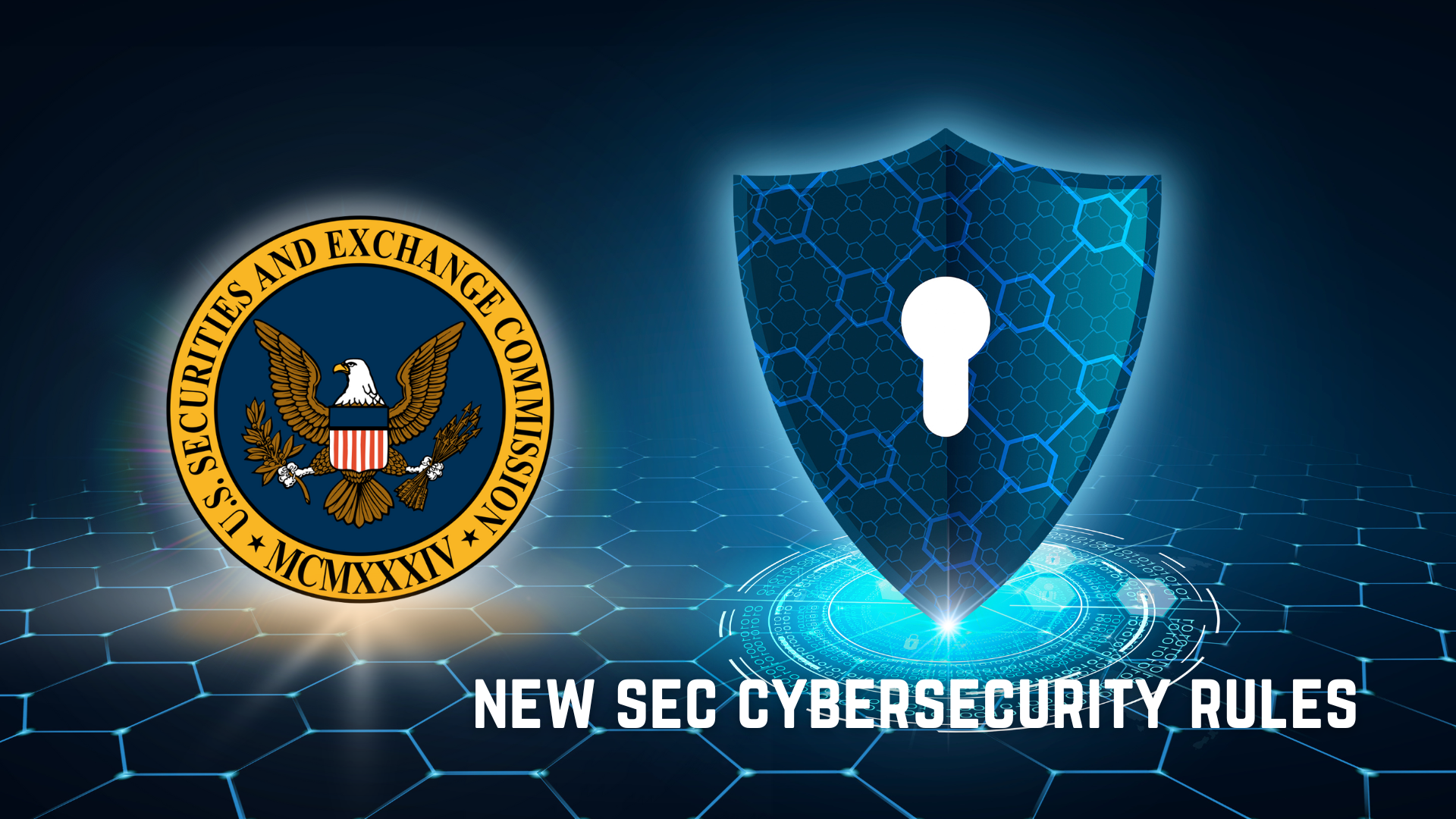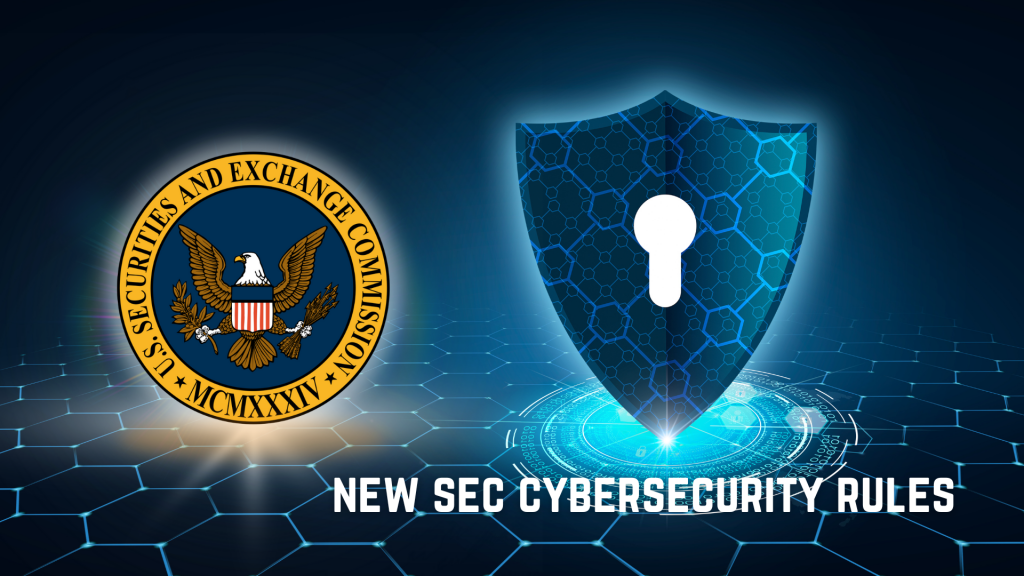

It’s been a month and a half since we rang in the New Year, so every organization with a desire to avoid security issues and government fines and penalties would be in alignment with this year’s new regulations. If you are not, you should waste no time bringing yourself into compliance.
It seems like a burden when new rules are put into effect, but the U.S. Securities and Exchange Commission (SEC) does implement new regulations in response to the ever-expanding threat matrix. As technology advances, so do the threats, and so do the regulations. These new rules revolve around data protection and overall security and are poised to significantly impact businesses.
These rules are not just a response to the growing sophistication of cyber threats, but for the need for companies to safeguard their sensitive information as well.
Let’s examine the key aspects of these new SEC regulations. We’ll review what they are and discuss how they may affect your organization.
Learning and Understanding the New SEC Requirements
The new cybersecurity rules put forth by the SEC emphasize the importance of proactive Cybersecurity measures for businesses operating in the digital landscape. The two central requirements are:
1) The timely reporting of security incidents.
2) Disclosure of comprehensive data security programs.
These rules impact U.S. registered companies as well as foreign private issuers registered with the SEC.
Incident Reporting
The first rule is the disclosure of network security incidents deemed to be ‘material’ on a new item 1.05 of Form 8-K.
Be forewarned that there is a time limit for disclosure. You must disclose an incident within four days of the determination that an incident is material. The company should disclose the nature, scope, and timing of the incident and the impact of the breach. One exception to the rule is where disclosure poses a national safety or security risk.
Cybersecurity Protocols Disclosure
This rule requires extra information that companies must report. They report this on their annual Form 10-K filing.
The extra information requiring disclosure includes:
Their processes for assessing, identifying, and managing material risks from cyber threats.
Risks from cyber threats that have or are likely to materially affect the company.
The board of directors’ oversight of cybersecurity risks.
Management’s role and expertise in assessing and managing Cybersecurity threats.
Potential Impact on Your Business
Is your business subject to these new SEC requirements? If it is, then it may be time for another network security assessment. Penetration tests and security assessments identify gaps in your protocols. They help companies reduce the risk of cyber incidents and compliance failures.
Here are some of the potential areas of impact on businesses from these new SEC rules.
- Increase in Your Compliance Burden
With an increase in regulations comes an increase in the overall compliance burden. As you work to align your security policies with the new SEC requirements, this might cause a significant overhaul of existing practices, policies, and technologies. Ensuring compliance will likely mean a large expenditure of time and resources. The impact is unavoidable for both large and small businesses.
- Focus on Incident Response
Incident response plans figure prominently in the new regulations. Businesses will need to invest in robust protocols designed to promptly detect, respond to, and recover from cyber threat incidents, including having clear procedures for notifying regulatory authorities, customers, and stakeholders. This would be a notification in the event of a data breach.
- Heightened Emphasis on Vendor Management
It is a rare business that does not rely on for on third-party vendors – from fundamental suppliers to peripheral services like phones and internet providers. The SEC's new rules emphasize the need for businesses to assess vendor practices, specifically in terms of data protections. This shift in focus necessitates a comprehensive review. That review should be of existing vendor relationships. It may mean finding more secure alternatives.
- Impact on Investor and Customer Confidence
Data breaches can easily erode customer and investor confidence and damage a company's reputation. With the SEC's spotlight on security, investors are likely to take note. This includes scrutinizing businesses' security measures more closely. Companies with robust cybersecurity programs may promote greater confidence among investors. This can potentially lead to increased investments and shareholder trust.
- Innovative Technologies
In the Information Technology world, this is a silver lining providing better security solutions. With the new SEC requirements in place, businesses must strive to meet them. In doing so, they will seek innovation to simplify the tasks at hand. There is bound to be a surge in the demand for advanced security solutions. This increased demand could foster a wave of innovation in the security sector, leading to the development of more effective cyber protection solutions.
The SEC Rules Bring Possibilities Along with the Challenges,
The new SEC requirements mark a significant milestone in the ongoing battle against cyber threats. While these regulations pose challenges, they also present opportunities. The opportunities are for businesses to strengthen their overall network security posture and enhance customer trust and investor confidence.
Companies can meet regulatory expectations by embracing these changes proactively. If it makes a company stronger, the change should be welcomed with open arms They can also fortify their defenses against the ever-evolving landscape of cyber threats. Adapting to these regulations will be crucial in ensuring the long-term success and resilience of any business.
Frequently Asked Questions
What is data privacy compliance?
A company is considered compliant when they meet the legal and regulatory requirements for collecting, storing, and using sensitive data. That is: properly handling sensitive customer data and adherence to data protection laws, regulations, and best practices.
How many data laws are there?
According to ICLG (International Comparative Legal Guides), a leading platform for legal reference, news, and analysis: “There is no single principal data protection legislation in the United States (U.S.). Rather, a jumble of hundreds of laws enacted on both the federal and state levels serve to protect the personal data of U.S. residents.”
What three elements should a data security policy include?
The ‘three pillar’ or ‘CIA’ approach consists of:
Confidentiality: Using encryption and secrecy to ensure that only authorized parties can view data.
Integrity: The data must not be modified or tampered with in any way.
Availability: Data must be readily accessible to authorized parties.
Who dictates security policy?
Going beyond the dictates of regulatory agencies, security policy is usually dictated internally by a collective within an organization: Senior management, a policy board, and/or a dedicated security committee. The policy must adhere to and enable all applicable regulatory compliances.
How secure is your network?
As a reputable member of the IT Support Los Angeles community since 2002, IT Support LA offers a FREE, no-risk network and security assessment. It is a non-intrusive scan that allows us to deliver a comprehensive report that is yours to keep. No strings, and no obligation to ever use our Managed IT Services.
The best defenses are expert Cybersecurity to protect your data from theft, and a top-notch Managed Services Provider to ensure continued reliability and defenses against newly emerging threats.
With our 100% Money Back Guarantee in writing, we offer a risk-free way for prospective clients to try us out. Because we do not require a ‘hard’ contract, our clients can fire us at any time with 30 days’ notice. We have to be good.
Among the Managed IT services we provide:
IT HelpDesk Service
Onsite IT Support
Cybersecurity
Cloud migration and management
Email migration services
Backup and disaster recovery
VoIP phone systems
IT disposition and recycling
Office moves
White label services (IT to IT)
IT Support LA is an award-winning Managed Services Provider (MSP):
o 3 Years awarded Best IT by the Small Business Expo
o Awarded 2nd best company of any type in the US by the Small Business Expo SB100
o Awarded Best IT in California by Channel Futures
o Winner of Best IT in Los Angeles by Channel Futures
o Listed as one of the world’s Top 501 Managed Services Providers by CRN and in the top 250 in the ‘Pioneer’ listing
o 4 years listed as one of the Top 501 Managed Services Providers in the World by Channel Futures
o Listed as #21 MSP in the World in Channel Futures NextGen 101
o Globee 2021 Bronze Award winner for Chief Technology Officer of the Year
o Globee 2022 Gold Award winner for Chief Technology Officer of the Year
o Named one of 2022’s 50 ‘Best’ businesses in California by UpCity
o Named one of 2023’s 50 ‘Best’ businesses in California by UpCity
o Named Best of IT Services winner by UpCity
o Winner of Local Excellence Award for 2021, 2022 and 2023 by UpCity
o Named Best of Cloud Consulting winner by UpCity
o Certified as Top Managed Services Provider and Cybersecurity Pro by UpCity
o Named Best IT Services in Los Angeles by Expertise.com.
Need Help with Data Security Compliance?
When it comes to ensuring compliance with any rules and regulations concerning data protection, it’s best to have an IT pro by your side. We know the ins and outs of security and compliance and can help you meet requirements affordably.
Give us a call today and take advantage of our FREE network and security assessment.
818-805-0909


